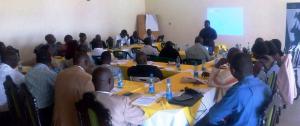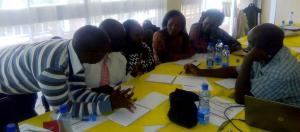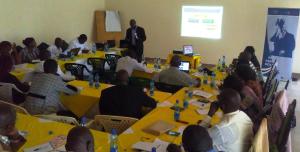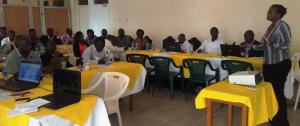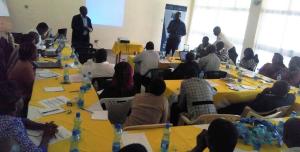On 22nd April 2016, the Konrad Adenauer Stiftung organized a one day stakeholders’ discussion forum held in Kabarnet, Baringo. The event brought on board 41 representatives from across the national and county government institutions, community and group representatives (including farmers’ associations and pastoralists) as well as non-state actors working within the field of food security and drought management in Baringo County. Main topics of the discussion were the findings of a study on Early Warning Systems (EWSs) commissioned by KAS, which was conducted both in Baringo and West Pokot Counties as well as at the national level from 3rd April 2016 to 12th April 2016. The study investigated the strengths as well as the weaknesses of the Early Warning Systems from a political and administrative point of view.
The objective of this stakeholders’ forum in Baringo was firstly to share on the preliminary findings of the above mentioned study and secondly to provide a platform for discussions and also for the development of a multi-stakeholders’ plan that would operationalize in particular pillar 5 of the “Ending Drought Emergencies (EDE)” Common Framework on drought management and response through an effective Early Warning System.
The discussion forum was opened by Hon. Caroline Lentepuru, the Baringo County Executive Committee member in charge of Agriculture on behalf of the Deputy Governor. She appreciated KAS and the “National Drought Management Authority (NDMA)”, the “Agricultural Sector Development Support Programme (ASDSP)”, “World Vision Kenya” and other partners in Baringo for their continuous efforts to address the problems of drought and food shortages. She further asserted that Baringo County relies heavily on indigenous knowledge and encouraged the representatives from groups of farmers and pastoralists in the forum to share their experiences on relevant information areas that would contribute to mitigating and ending drought emergencies and food shortages within their communities.
During the forum, there was a general re-examination of the six EDE pillars and their conceptual background in ending drought emergencies. Furthermore, KAS presented the preliminary results of her study research and shared her experiences with respect to the data collection exercise. Furthermore, KAS subsequently pointed out an array of issues that would eventually be summarized in the draft report: Thereby, these issues ranged from poor information flow and distrust due to contradictions and community perceptions, to basic capacity problems in utilizing early information to pre-empt and address perceived ‘insignificant’ calamities in the absence of the yet to be developed standard operating procedures.
In a second step, the different stakeholders were taken through several presentations on how they could identify issues within their communities or areas of work that are a pointer to either weaknesses or strengths of the drought early warning systems. After the presentations, the participants were grouped into four with each group being tasked to identify actual issues central to pillar 5, and in particular to Early Warning Systems within their communities, wards and areas of work. Based on the results that the group representatives had presented, the emerging issues were then integrated into the development of a common stakeholders’ plan meant to operationalize EDE Pillar 5 in Baringo County. Thereby, essential cross cutting issues within the other pillars, e.g. such as on peace and security under pillar 1, were also infused.
In general, the KAS-forum was highly successful and brought about concrete results that enhance further joint procedures in the future: The event brought the various stakeholders together, facilitated discussions among the different groups of interests as well as joint brainstorming of all stakeholders involved and hence also provided a platform to develop a draft of a common action plan for operationalizing pillar 5.
This draft of a multi-stakeholders’ plan is now to be refined by a task force made up of ten representatives from the participating institutions. The final common plan will then be shared among the stakeholders and with KAS before the official launch of the EDE in Baringo County by NDMA as well as national and county governments.
The six pillars of the “Ending Drought Emergencies (EDE)” common framework
1.Peace and security
2.Climate-proofed infrastructure
3.Human capital
4.Sustainable livelihoods
5.Drought risk management
6.Institutional development and knowledge management
The respective pillar that was a crucial element of this discussion forum was pillar five on drought risk management, which has a priority in strengthening Early Warning Systems and information sharing.



